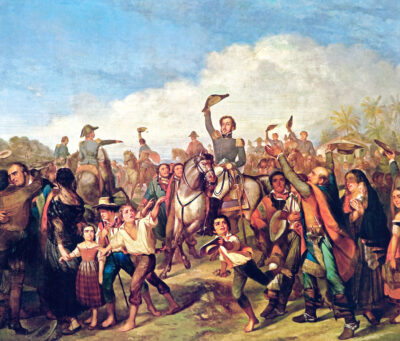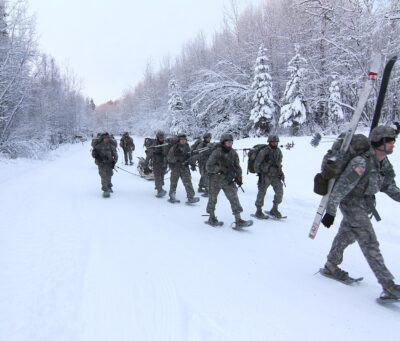There is a reason that Alexander Hamilton was known for both economic and foreign policy; the two are connected by a common question: Compared to what? Thomas Sowell has popularized thinking of “compared to what?” as the fundamental economic Rorschach because it prompts people to think about trade-offs. All too often in economic policy discussions, people are quick to propose solutions without thinking of the trade-offs involved. As Sowell liked to quip, there are no solutions, only trade-offs.
Sowell’s view is more accepted today than it was a few decades ago, when economic “solutions” like price setting or nationalized industries had a broader base of intellectual support. But viewing foreign policy through a “solutions-oriented” lens is still popular. In truth, foreign policy, like economics, is fundamentally about people making decisions, and there will always be trade-offs. Those trade-offs are often (even usually) undesirable, yet effective statesmen like Hamilton knew that they had to be made.
Consider the basic game theory example of the chicken game. The chicken game postulates two cars driving towards each other, and each car has two choices, go straight or swerve. If both cars go straight, they crash into each other. If one goes straight and the other swerves, the one that goes straight wins. If both cars swerve, it is a tie. There are no other outcomes.
There is a reason that game theory is commonly used in foreign policy thinking. Game theory always involves oversimplification, but instructively so. The idea is this: in game theory, the choice you would really like is often not available to you. When professors first lay out the chicken game’s exposition, there is infallibly a smart-aleck in the back of the class who raises a hand and asks, “How about we just not drive cars towards each other?” Surely we would all prefer that, but it is not in the cards. The technical term for the student’s idea is that it is “outside the strategy space.” The strategy space in the chicken game includes two strategies: straight or swerve. Those are the relevant choices; all others are irrelevant.
Further, game theory is the study of strategic interdependence, which means that your best move is dependent on the other player’s move. If the other player does something different, your best move may change. It is something we do not like to think about, and often makes us uncomfortable, but it is also a fact. Game theory is a helpful way to model that reality.
In foreign policy decisions, it is virtually never the case that there is only one relevant choice to make between two strategies like in the chicken game. However, the principles of the chicken game hold for the game of diplomacy.
Consider the Persian Gulf, for example. The United States Navy’s Fifth Fleet is headquartered in Bahrain in the Persian Gulf. This makes anti-interventionists uncomfortable. Bahrain is an Islamic monarchy with a disregard for liberal values. Why does the United States spend gobs of money to be in a body of water that it does not own in the first place? Why does the United States need to be in the Persian Gulf at all, let alone headquartered in such a bad country?
It is undeniable that Bahrain does not endorse liberal values. It is undeniable that it is very expensive to maintain the Fifth Fleet halfway around the world. It is undeniable that the United States uses its military to forcefully intervene in foreign affairs. You do not have to like that. But opposition on those grounds alone fails to ever ask the question, “Compared to what?”
If you ask that question, you find that opposition to this intervention is pretty fruitless: it is comparing the world as it actually is to a perfect, imaginary world. Let’s examine the situation in two parts.
The Persian Gulf: Part One
What is the contention? The United States should not be involved in the Persian Gulf since it does not belong to the United States.
Compared to what? Iran would control the Persian Gulf if the United States were not there. Iran has the longest shoreline on the Persian Gulf by far, and the very name of the body of water suggests that it is theirs (in fact, there is a naming dispute: the Arab states call it the Arabian Gulf, which puts the United States in an interesting position diplomatically). Around April 30 every year, Iran celebrates National Persian Gulf Day. If that is not enough evidence for you, in 2018 the head of Iran’s Revolutionary Guards said, “We can ensure the security of the Persian Gulf and there is no need for the presence of aliens like the United States and the countries whose home is not in here.”[1] Ali Khamenei, the supreme leader of Iran, also said that Iran should close off the Persian Gulf at the Strait of Hormuz if Iran is not allowed to export oil. [2] That is just one sample of decades of similar comments from Iranian military and political leaders. Freedom of navigation in the Persian Gulf is in America’s interest, not because America needs the oil (fracking has made oil imports less and less necessary) but because American allies do.
What is the real, relevant choice? The United States is either involved in the Persian Gulf or Iran has near-complete control of the Persian Gulf.
How does that change decision making? In the original framing, the choice is internal to the United States. It is a single-player game, not a very interesting or difficult one. We weigh the costs on our end and decide. The real, relevant choice is at least a two-player game, but really many more than that because there are so many other countries that either border the Persian Gulf or have interests there. Now the decision is not whether to be there but how to exert influence there most effectively for American interests.
The Persian Gulf: Part Two
What is the contention? The Fifth Fleet should not be based in Bahrain because Bahrain is an illiberal monarchy that hurts the United States’s moral credibility.
Compared to what? Given that the United States does not have much of a choice whether to be involved in the Persian Gulf, it is difficult to say where else the Fifth Fleet should be based. There are no liberal democracies on the Persian Gulf. No matter where the United States bases the Fifth Fleet, it will be in an illiberal regime. It cannot be based outside the region because boats are rather slow, and time is of the essence in responding to threats and securing trade routes.
What is the real, relevant choice? In which Persian Gulf country will the United States base the Fifth Fleet?
How does that change decision making? America has to compare the countries against each other. Iran is a hostile power; we cannot base ships there. Oman barely has any shoreline. That leaves Kuwait, Saudi Arabia, Qatar, the United Arab Emirates, and Bahrain. Now, think about location. Bahrain is an island; it is centrally located; America has had a presence there for quite some time. And, the clincher: Bahrain has one of the only ports on the Persian Gulf deep enough for American aircraft carriers.[3] Geography matters a lot in basing decisions, and in creating conflict in general. The Persian Gulf would be a much less of an issue if there were more than one way in and out of it. These are not moral or philosophical questions; they are very practical ones.
Apply similar reasoning to other situations; rinse and repeat. Being involved in the South China Sea is not a question of whether to be there or not be there. It is a question of whether the United States be there or China be allowed free rein. Leading NATO is not a question of leading NATO or not leading NATO. It is a question of leading NATO or giving Russia a green light to agitate the Baltic States.
This is not just American chest-beating by bagel-snarfing warmongers (Jonah Goldberg’s affectionate term for foreign policy neoconservatives). [4] Even those who style themselves as their opponents would do well to adopt “compared to what?” as their own strategic Rohrschach. Even and perhaps especially libertarians, if they reroute their thinking through this prism, might quickly come to the conclusion that a forward-leaning foreign policy is in their interest. For example, free trade is not the natural condition of the world, as anyone who has had an argument with a non-economist knows. Accordingly, conditions for free trade are extremely expensive to maintain.
Economist Tyler Cowen’s “State Capacity Libertarianism” seems more open to this way of thinking. Cowen wrote that “State Capacity Libertarianism is not non-interventionist in foreign policy” and noted the salutary role of Pax Americana in much of Asia’s recent economic development. [5] He also sees a role for the state in “keeping China at bay abroad,” which will be vital to Cowen’s overarching goal, “the maintenance and extension of capitalism.”[6] The Chinese Communist Party has demonstrated, contrary to many expectations, that market reforms and brutal totalitarianism can coexist in the same regime, and keeping that regime in check has ramifications for billions of people’s liberty.
One of the ways the United States does that is by conducting freedom of navigation operations (FONOPs). FONOPs are vitally important in places like the South China Sea, through which around half of global trade passes. China has constructed artificial islands that it claims establish territorial waters and is constructing military bases on those islands. This is all against international law, but China does not recognize the legitimacy of international rulings against it. [7] So, the United States Navy conducts FONOPs every once in a while to keep trade flowing and the People’s Liberation Army Navy (PLAN) on its heels. This situation is far from ideal, but it would be far worse if the Chinese Communist Party possessed its desired level of control in the South China Sea.
To be clear: I do not wish to be flippant, nor to make light of the gravity of these questions. They are difficult ones that very smart people spend their whole lives working on. They require the efforts of experts because they are prickly: ready-made solutions are never on offer. There are, as Sowell would say, only trade-offs. The cars in the chicken game are already driving towards each other, and when you are steering the ship of state, you cannot hop out of the car or hit the eject button. That’s outside the strategy space – and the Iranians or Chinese in the other car will be happy to take the win.
Alexander Hamilton’s eminence in early American economic and foreign policy is sensible, as he understood that the fundamental question underwriting both is the same: compared to what? Understanding the nature of competition and adeptly dealing with trade-offs are vital skills for economists and ambassadors alike. We need more policymakers and statesmen today who get that – at a gut level.
Dominic Pino is a MA candidate in Economics at George Mason University. He was a 2020 Political Studies Fellow with the Hertog Foundation.
—
Notes:
[1] “Iran says it has full control of Gulf, United States Navy does not belong there,” Reuters, 27 August, 2018, http://news.trust.org/item/20180827115338-hpqo0.
[2] “Iran says it has full control,”Reuters, 27 August 2018.
[3] Kenneth Katzman, “Bahrain: Unrest, Security, and U.S. Policy,” (Washington, DC: Congressional Research Service, 2020), 16, https://crsreports.congress.gov/product/pdf/RS/95-1013.
[4] Jonah Goldberg, “Good Riddance to a Bad Man,” The Dispatch, 3 January 2020, https://gfile.thedispatch.com/p/good-riddance-to-a-bad-man.
[5] Tyler Cowen, “What libertarianism has become and will become – State Capacity Libertarianism,” Marginal Revolution, 1 January 2020, https://marginalrevolution.com/marginalrevolution/2020/01/what-libertarianism-has-become-and-will-become-state-capacity-libertarianism.html.
[6] Cowen, “What libertarianism has become and will become – State Capacity Libertarianism.”
[7] Dean Cheng, “Sounding the Warning: DOD Report Examines the Growing Security Threat from China,” (Washington, DC: The Heritage Foundation, 2017), https://www.heritage.org/defense/report/sounding-the-warning-dod-report-examines-the-growing-security-challenge-china.
Image: “Normalized Rorschach blot 01” by Hermann Rorschach (died 1922), retrieved from https://web.archive.org/web/20070820233339/http://ar.geocities.com/test_de_rorschach/, image is in the public domain.



